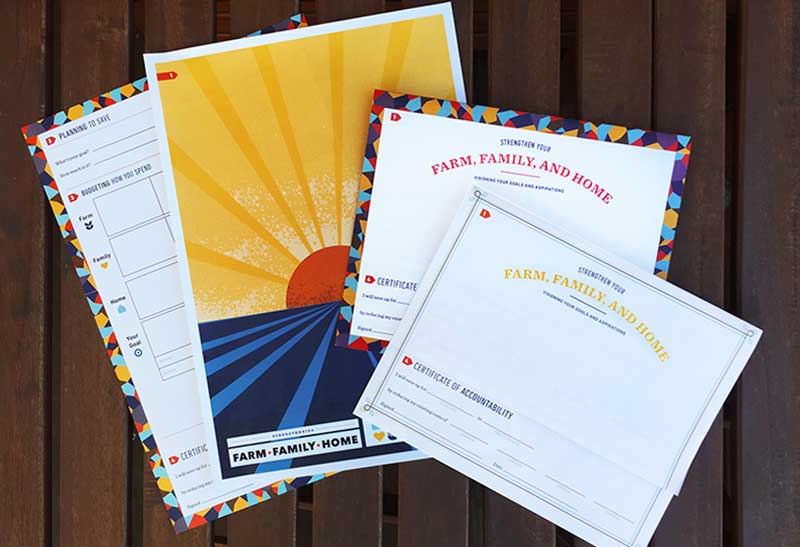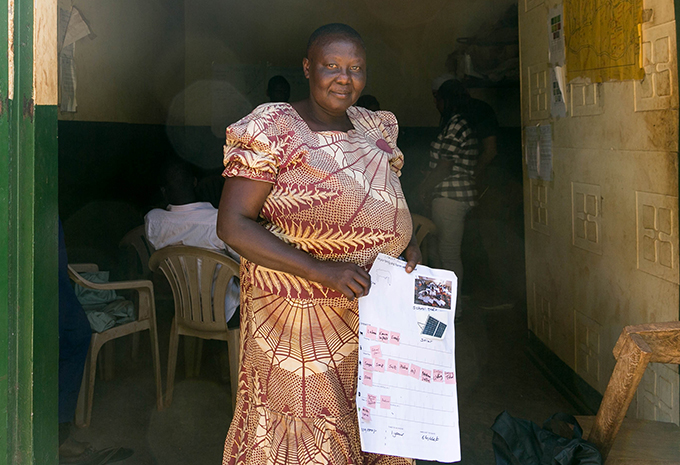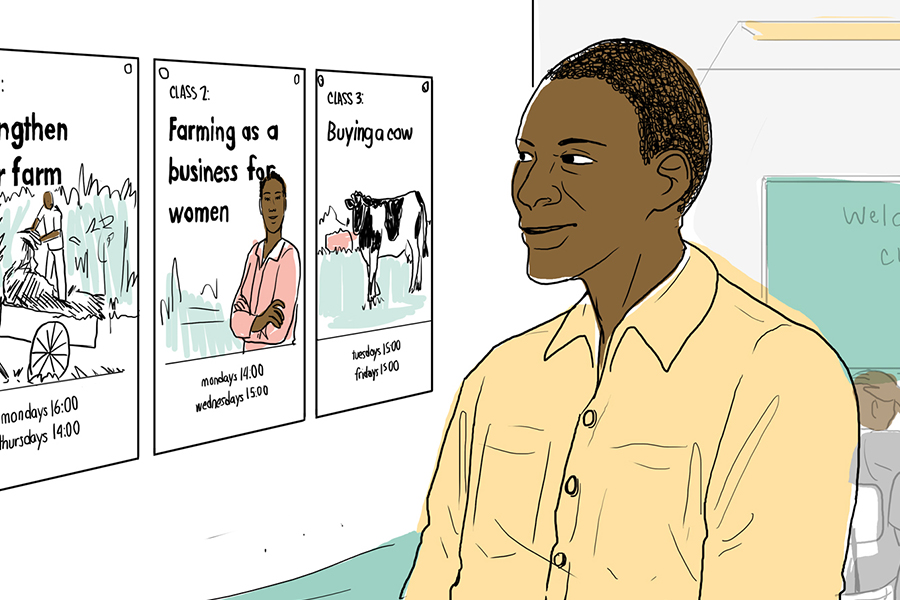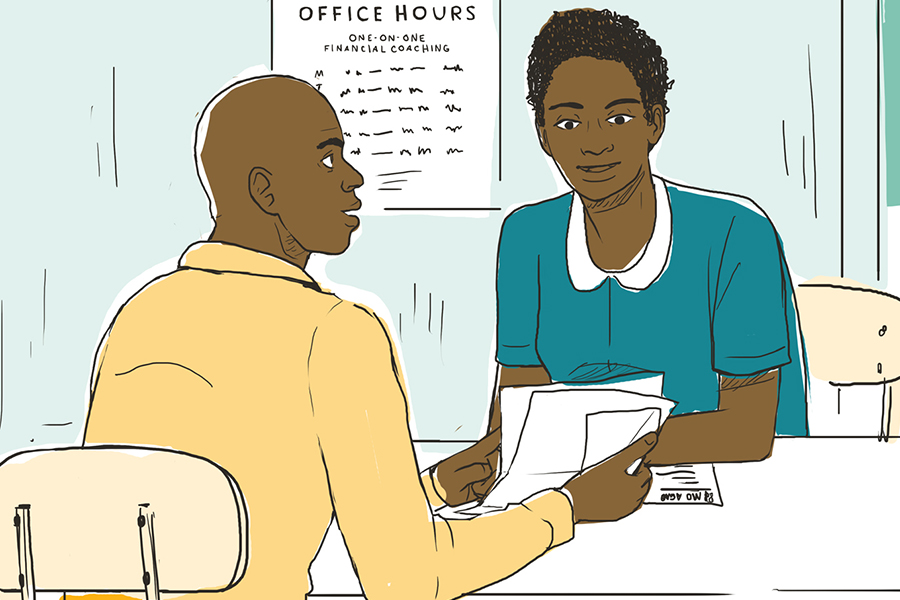Imagine
A financial planning service that not only helps farmers set goals, budget, and save, but also highlights how mobile money can be used as a tool to accomplish these objectives.
We believe the value of mobile money is best communicated through financial planning sessions where farmers can make direct connections to how using mobile money can improve their farms and benefit their families.
In January we prototyped this concept by taking coffee farmers and KCL staff through a financial planning activity with a financial coach, iterating on script, approach, and class size.
A financial planning service that not only helps farmers set goals, budget, and save, but also highlights how mobile money can be used as a tool to accomplish these objectives.
Ask farmers to define goals for themselves, their families, and their farms through visioning collage exercises, and help them develop an actionable plan with interactive budgeting activities.
Design for all education and experience levels, and understand that every farmer will have a different grasp on the information provided.
Guide farmers to understand that, in addition to sending and receiving funds, mobile money can also be an important tool to help them reach their financial objectives.
Challenge farmers to make a plan, set a realistic timeline, and sign a contract verifying their commitment, then share it with classmates to help build support—and hold each other accountable.
The financial planning service will be a 45-minute session with one instructor, one facilitator/translator, and an ideal class size of approximately five farmers.
Farmers will be encouraged to get to know each other and present their plan at the end of each session as a way to create camaraderie and social support.
A trained instructor will walk farmers through activities using their personal examples of both previous and current goals to inspire the class.
Instructors will be provided with a detailed script to coach farmers through every step of the activities.
The worksheet begins with a visioning/collage exercise that sets the foundation of the lesson and is an opportunity for farmers to visually represent their goals.
Farmers are encouraged to take worksheets and display in their homes for reference. Worksheets have been designed to exhibit the most important information when put on display in farmer’s homes.


Simple and interactive budgeting activities are used to create a realistic plan for the farmer’s goal. For budgeting, farmers will physically move post-its from one section to another symbolizing the trade-off they will be making. Math calculations are reduced to a minimum to increase accessibility of the exercise.
Worksheet ends with an accountability contract summarizing key aspects of their plan and reinforcing their commitment.
Mobile money will be contextualized near the end of the session as a tool to help the farmers follow their plans to reach their goals. The script provided will inform instructors on how to talk about mobile money in a warm friendly fashion that is not salesy.
Farmers will also be made aware of the additional value mobile money can provide as a way to generate interest, access credit, and receive loans.
A mobile money representative that can sign farmers up for mobile money and Mo’Kash should be available after each session. If the representative is not on hand, the instructor will take interested farmers to a local mobile money agent.
Before a buyer develops the technological capabilities to pay in mobile money, or before they enter a new market, financial planning can be used to educate farmers on the value of phone-based banking.
During home visits in the off-season, KCL will integrate financial planning into their agricultural “sensitization training”. This is a time when farmers are available and open to full lesson plans.
Farmers are busy and distracted while visiting the washing stations during harvest season. This will be a time to offer supplemental financial planning services, such as tracking financial progress and optional/flexible focused classes.
Establishing mobile money as a tool in the context of a farmer’s financial goals and aspirations increases trust in the service as an effective means to help them climb out of the cycle of poverty.
Financial planning sessions are simple, visually engaging, designed for all education levels, and conveniently located for farmers (in their own communities and homes during the off-season visits, and at the washing station during harvest season).
Pairing goal setting with mobile money helps farmers to understand how they can immediately begin to derive value through incremental savings that contribute towards a larger goal.
KCL will run prototype verion 2 of the financial planning service in the coffee off-season during “sensitization training” in farmers’ communities. The IDEO.org team will train KCL instructors, as well as print and send necessary assets to KCL for prototypes, including two different visual designs of the worksheet for A/B testing. We will capture metrics related to farmers’ understanding and attitudes toward mobile money before and after each session. Once the sessions have been completed, we will capture success metrics related to mobile money usage.
These courses—which could be offered during off season or harvest-season—will include specific subject progressions, as well as classes for individual aspirations or needs, (ex. female-focused, purchasing a cow as an investment, etc.)



Periodically a financial coach will come to the washing station to offer detailed assistance on goal-setting, budgeting, and saving to individual farmers. Office hours will be during the harvest season, and farmers will be notified of scheduling and availability in advance by KCL staff, as well as through advertisements at the washing station.
A tablet application which improves the mobile money payments process by simplifying it. More intuitive UX design, quicker payment speed thanks to mobile data connectivity, and streamlined KCL staff workflow will make this a more effective tool.
A shop that accepts mobile money. Situated at rural coffee washing stations, this outpost—run by KCL and local merchants and/or mobile money agents—will offer basic necessities, agricultural inputs, and hard-to-find items.